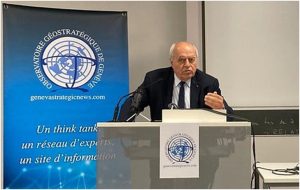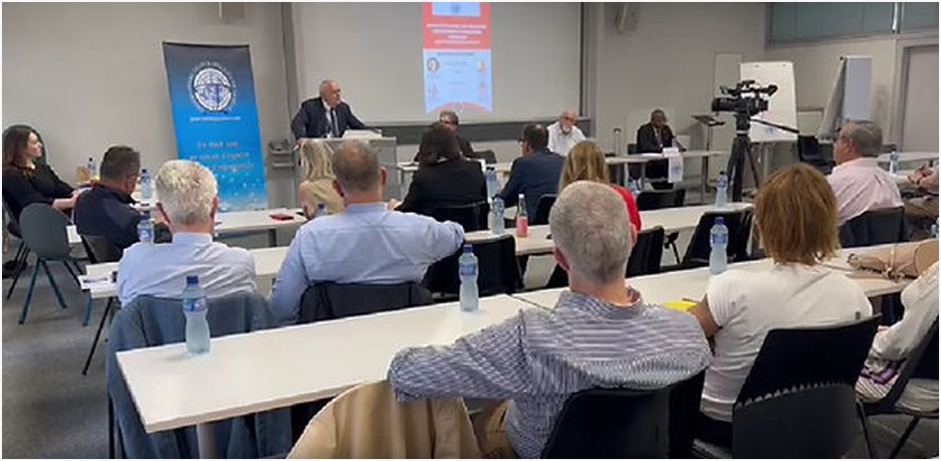
“How did the Sahel become the epicenter of global terrorism? “. This question raised by the Geneva Geostrategic Observatory was the subject of an extremely interesting debate held at the University of Geneva on Thursday 22 June 2023.
The conference-debate was moderated by a panel of international experts from the academic and intelligence worlds, including Alain Juillet, former Director of Intelligence at the DGSE, Paul Kananura, political scientist and President of the Afrika Institute, and Rémi Baudoui, Professor of Political Science and International Relations at the University of Geneva.
The conference was also attended by students and professors from the University of Geneva and foreign research institutes, representatives of international organisations, diplomats and journalists.
The speakers recalled how and why the Sahel had become the epicenter of global terrorism, before drawing up a complete map of the various groups operating in the region. A precise and rigorous presentation that highlighted the international community’s lack of foresight. The international community is now trembling at the thought that this new bastion of jihadism could sooner or later pose a threat to Western countries.
Rémi Baudoui, professor at the University of Geneva and specialist in the question of terrorism opened the conference by recalling the influence of contemporary world events on the situation in the Sahel. And to evoke the factors which explain the deterioration of the overall situation of Sahelian zone’s countries. The emergence of violence through crime, militias and vigilante groups and terrorism are constantly growing phenomena in the region.
Alain Juillet introduced his presentation with an overview of the different religious and historical influences on the region. The latter underlined the consequences of colonization on the political balance of the countries concerned. He also took the opportunity to mention the various intra-national divisions between the peoples of the South and the North. Resentment fuelled by the memories of past conflicts remains a powerful catalyst of rivalries. The fall of Colonel Gaddafi, the exodus of Algerian Islamists pushed back to the South and the strategies of the neighboring powers have a heavy influence on the situation in the Sahel. The numerous national, regional and international conflicts and disagreements have led to an implosion of the balance within this area. Added to this is the incomplete management of counter-terrorism operations by the Western powers. This has favored the emergence of a nebula of terrorist groups which feed on the resentment of populations against foreign powers.
According to Paul Kananura, instability influences the guarantee of social security, which is currently absent in the countries of the Sahel. He regrets that international operations such as Operation Barkane, Operation Serval and the UN operation were not followed by maintenance to ensure stability downstream from military victories against terrorists. On the other hand, the operations were preceded by malicious actions by some local groups. Local conflicts that have become international because of their importance are also prey to political manipulation, through finely played reshuffles. Paul Kananura drew a picture of all aspects of Sahelian society, concluding that the region is the victim of long-lasting and global instability. He questions: where do the resources of the terrorists unavailable in the region come from? Is it the right strategy to attack a global modus operandi (terrorism) rather than a specific group? Would it be efficient to consolidate anti-terrorism strategies instead of developing several at once according to the positions of the partners? The presence of new counter-terrorism players and the convergence of military strategies, viable development and the rights of the population are all desirable if there is to be any hope of a reduction in the incidence of terrorism in the Sahel.
The exchanges that followed highlighted another underlying political problem related to the Sahara issue. A participant asked if Algeria could claim to play in the fight against terrorism in the Sahel while it supports the Polisario, some of whose members are implicated in terrorism cases or involved in trafficking. And also to wonder if the rapprochement of Algeria with Russia and Iran would not reshuffle the cards in terms of partnership in the fight against terrorism. Asked about the Saharawi question which arose during the debate, Alain Juillet replied that in “Western Sahara, the solution must go through a negotiation which must lead to a form of autonomy. However, I am not sure that autonomy is desired by everyone. What Algeria, which supports the Saharawis, wants is access to the sea, and if a country is autonomous, access to the sea is hardly guaranteed”.


